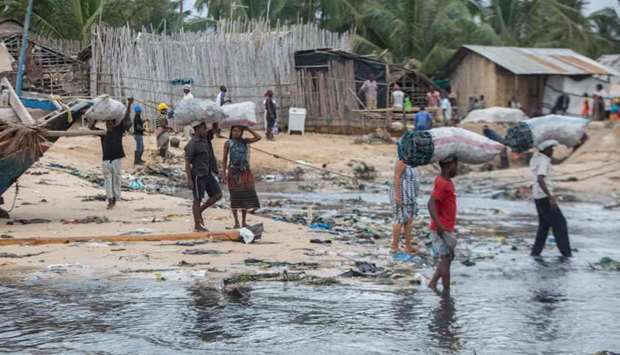The UN said Friday that tens of thousands of people had fled the town of Palma in northern Mozambique following militant attacks late last month that left dozens dead.
The UN refugee agency said around 30,000 people had fled Palma since Islamic State-linked militants raided the coastal town on March 24.
UNHCR spokesman Babar Baloch said the agency was ‘deeply concerned by the humanitarian consequences of the rapid escalation of violence’ in northern Mozambique.
He voiced particular concern about ‘the safety and well-being of the most vulnerable among the displaced, including women and children.’
The raids late last month marked a major intensification in an insurgency that has wreaked havoc across Cabo Delgado province for over three years as the militants seek to establish a caliphate.
The violence pushed France's Total to suspend work on a nearby multi-billion-dollar gas project.
‘Those who fled have faced significant barriers trying to reach safety both inside the country and while attempting to cross borders,’ Baloch told reporters in Geneva.
Conflict in the region has ‘resulted in grave rights abuses, the disruption of critical services and severe impact on civilians, particularly children,’ Baloch said.
‘Women and children also make up nearly 80 percent of the victims of human rights abuses that UNHCR teams are supporting,’ he said.
Equally concerning, he said, was the separation of families.
‘Hundreds of children have arrived traumatised and exhausted after being separated from their families. Many others have come with their mothers.’
Baloch said those escaping violence were arriving with ‘no belongings, often with health issues including injuries and severe malnutrition.’
He stressed that some people were continuing to flee Palma.
‘With only a few evacuation routes remaining open, we are worried for those who are unable to leave the area,’ he said.
Cabo Delgado has been battered by a bloody militant insurgency since 2017 by a group known locally as al-Shabab.
The violence has killed at least 2,600 people according to the US-based Armed Conflict Location and Event Data (ACLED) project, and forcibly displaced more than 700,000 people, according to UNHCR numbers.

